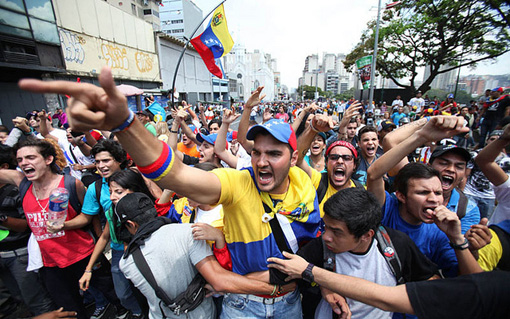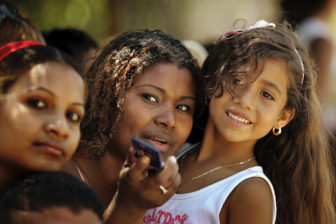Over the last week, Brazil’s protests have captured headlines worldwide. But Brazil is not the only South American country engulfed in protests. Since early June, Venezuela has been witnessing a series of protests involving the university sector. As with the public demonstrations in Brazil, the protests in Venezuela are a sign of deep political problems.
The university unrest in Venezuela formally began on May 30, when college faculty, students and staff went on strike to protest the underfunding of higher education. A total of 18 universities—all the autonomous institutes and other public universities—have since then interrupted academic activities.
Protesters point to the fact that universities are operating with the same budget as in 2006, with no upward adjustments despite Venezuela having one of the highest inflation rates in the world. Because of this budget crisis, a full-time faculty member today earns less than $300 per month. Labs and other instructional materials are, as with so many food items, in a situation of utter scarcity.
Remarkably, students decided to join forces with faculty. They too face precarious academic conditions. The poorest students—who are eligible to apply for funding starting in their first year of college—have seen their monthly allowances increase from $12 to $19, which is insufficient for subsistence in one of the most expensive countries in the world. University cafeterias are abysmally underfunded, and insecurity is rampant across all campuses. The government estimates that 15 percent of students are on strike. An unprecedented number of college students—more than 65 of them—have gone on hunger strikes across many Venezuelan cities.As is the case with protesters in Brazil, those in Venezuela are appalled that a country that generated so much wealth and economic growth in the last decade would leave important social sectors underfunded. Venezuela has one of the largest education sectors in Latin America. It was large before Hugo Chávez took power, as one would expect for high middle-income countries, and it became even larger under Chávez, in part due to the government’s efforts to promote graduation rates. Yet, the education budget has stagnated, despite Venezuela’s booming economy since 2004.
Despite these important budget figures, the Venezuelan university strikes are about more than just securing higher salaries, benefits, stipends, and study conditions—just like the Brazilian protests are about more than just the cost of transportation. At the core, this is a protest against the status of state-society relations. What is irking professors the most is the government’s refusal to recognize their union, the Federación de Asociaciones de Profesores Universitarios de Venezuela (FAPUV).
They are also bothered by the government’s dismissiveness. Whereas Brazilian President Dilma Rousseff responded to protests by saying that “they deserved to be listened to,” Venezuelan President Nicolás Maduro called the strikers “groundless conspirators,” “irresponsible” and “right-wing dinosaurs.” Rousseff cancelled a trip to Japan to deal with the crisis. Maduro instead proceeded with plans to travel to Europe to meet with the Pope, receive a United Nations prize for eliminating hunger and visit the tomb of Italian Marxist Antonio Gramsci.
For the protesters, this response by Maduro is vintage chavismo. When Hugo Chávez (1999-2013) encountered a civic group that he could not control, he responded by badmouthing it, underfunding it and superseding it by appointing a parallel organism populated with those who would agree with his policies. He did that with the university system in 2003, when in the midst of protests across the country, he founded the Bolivarian University as an “alternative” to the country’s public university. He has also established three other institutes of higher learning.
Chávez used the same approach of “ignore and parallel-appoint” in politics. In 2008, when the opposition won five governorships and the mayoralty of Caracas, Chávez responded by accusing all the opposition winners of being in cahoots with the oligarchy/imperialism, and proceeded to appoint parallel government structures and budgets.
This is not the first time that the university sector in Venezuela has risen against the chavista style of state-society relations. In 2007, university students shocked the world when they came out to protest Hugo Chávez’s decision to take RCTV off the air, to interfere directly in student elections, and to go forward with a referendum to overhaul the constitution with proposals that only a handful of advisers had helped to draft. University students led protests in January this year demanding more information about Chávez when he was in seclusion, and in April to decry Maduro’s rushed inauguration before a full audit of the contested electoral results.
Likewise, faculty have in the past protested whenever the government has tried to curtail the autonomy of universities and the integrity of elections for faculty unions.
Sadly, the university is not the only sector that has been protesting in Venezuela. PROVEA, one of Venezuela’s most respectable human rights advocates, reports that street protests in Venezuela more than doubled during Chávez’s second term, from 1,576 in 2006–2007 to 3,925 in 2012. Most of these protests are led by ordinary “neighbors” (vecinos) and workers.
Venezuela is thus a country engulfed in protest, now from almost every sector of society. Under Chávez, these protests achieved little, in part because the government had such strong backing from parts of the electorate that Chávez always felt secure enough to ignore them. But Maduro’s government is Venezuela’s weakest in 10 years. His electoral victory over Henrique Capriles was tiny (a 1.5-point difference) and questioned by almost everyone in the opposition.
And yet, Maduro still has financial resources at his disposal. Despite monumental budget deficits, Venezuela continues to enjoy historically high oil prices. Not surprisingly, Maduro has already decreed salary raises. That was easy for him to do. Whether he can also change his approach to state-society relations remains to be seen. He campaigned for office by calling himself “the son of Chávez,” the true essence of continuity, and on this issue, he is proving to be right.







